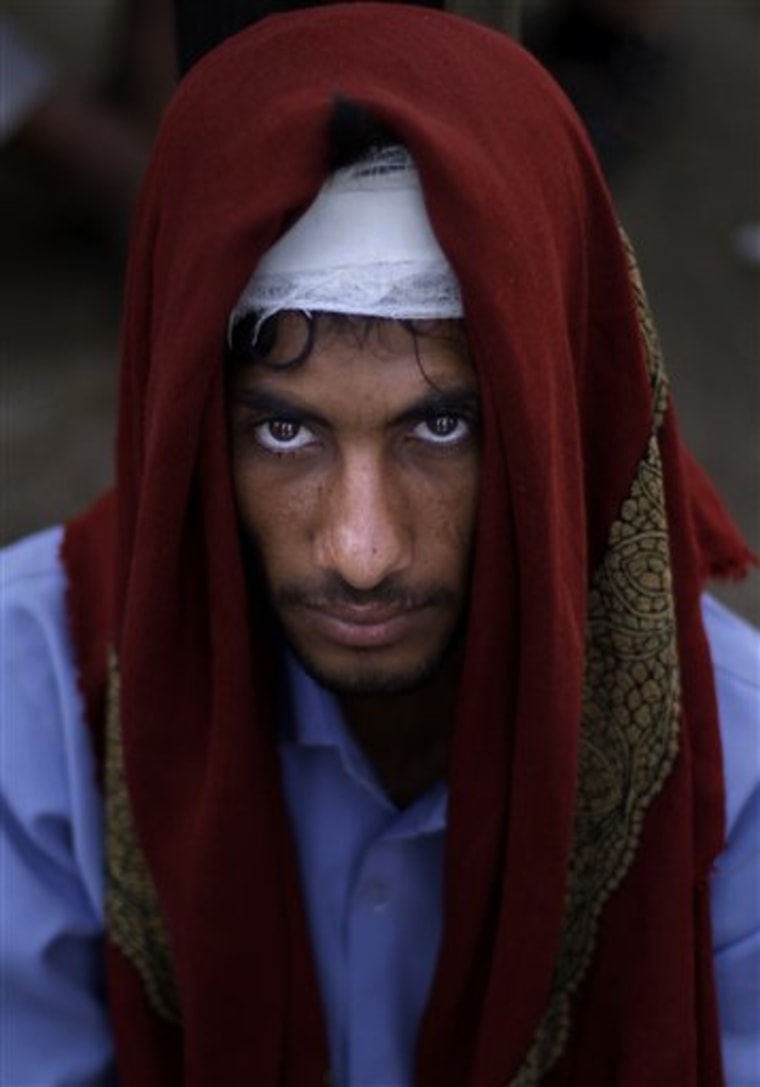Attackers stabbed a Yemeni provincial governor in the neck with a dagger on Monday, and at least 60 other people were wounded in confrontations around the nation between security troops and protesters seeking to topple the country's leader of 32 years.
A month of protests set in motion by the tumult sweeping the Arab world appears to be spiraling out of control in Yemen, already one of the most impoverished and volatile corners of the Arab world.
President Ali Abdullah Saleh — who has faced down threats from an al-Qaida offshoot, a secessionist movement and a seven-year armed rebellion in the north — has been unable to stop street protests that are unprecedented in their scope and in the broad cross-section of society taking part.
In a sign of his frustration, Saleh fired the government minister in charge of trying to engage his opponents in dialogue.
Violent crackdown
In the eastern Marib province, a predominantly tribal area, protesters staged a large demonstration Monday outside the local government building and shouted anti-regime slogans. Security troops fired live ammunition and tear gas, injuring around 37 people. In the melee, a group of men stabbed Governor Naji al-Zaidi and four bodyguards with daggers, the Interior Ministry said.
In Yemen, many men carry an ornamental dagger tucked in their waistband. The statement held opposition leaders responsible for the attack and other confrontations and bloodshed.
Al-Zaidi was flown by helicopter to a military hospital in the capital, security officials said on condition of anonymity because they are not authorized to brief the media.
With no sign his opponents will accept anything less than his ouster, President Saleh has filled the streets with armed supporters in an increasingly violent crackdown.
In the southern city of Taiz, police tried to disperse demonstrators with gunfire and tear gas, injuring three people. Clashes in the northeastern province of Jawf injured at least 20 more.
The opposition gained support Monday from striking workers, as well as from university professors and a growing number of powerful tribal chiefs turning against Saleh. The backing of Yemen's tribes is crucial for Saleh, who depends on those alliances to extend his weak government's control beyond the capital, Sanaa.
The unrest in Yemen is of deep concern to the United States and other world powers, in particular, because al-Qaida has established one of its most dangerous offshoots in the country's mountainous hinterlands. It has launched attacks beyond Yemen's borders, including a failed attempt to blow up a U.S.-bound airliner in December 2009 with an explosive device sewn into the underwear of a would-be suicide bomber.
Late Sunday, Saleh replaced a government minister who failed to persuade the expanding protest movement to hold talks with the government.
The protesters, fed up with corruption, poverty and a lack of political freedom, have demanded that Saleh step down and have rejected his offers to form a national unity government. Saleh also failed to appease the protesters with a pledge at the start of the unrest not to seek another term in office in 2013.
Journalists deported
Also Monday, two American and two British journalists were deported from the country after being detained for several hours, one of them said.
Briton Oliver Holmes said five armed security agents took them into custody Monday morning from the apartment they shared in the Yemeni capital. He said one of the security agents told them they had to leave because of the stories they were writing.
Yemeni security officials told The Associated Press they were detained for illegally entering the country, without elaborating. They spoke on condition of anonymity because they are not authorized to speak to the media.
In the streets of the capital Monday, police and plainclothes security remained locked in a standoff with protesters camped out in a square near Sanaa University. Hundreds more protesters were planning to reinforce them.
The protesters are gaining support from tribal chiefs, senior officials and university professors. About 50 professors from the universities in the cities of Aden, Sanaa and Taiz have resigned from President Saleh's ruling Congress Party.
Amin al-Ukeimi, a leader of the powerful Bakeel tribe, announced Monday that he is joining the protesters in the capital and supported their demand to bring down the regime. Mohammed al-Houri, an undersecretary at the Planning Ministry, also announced his resignation from the party.
